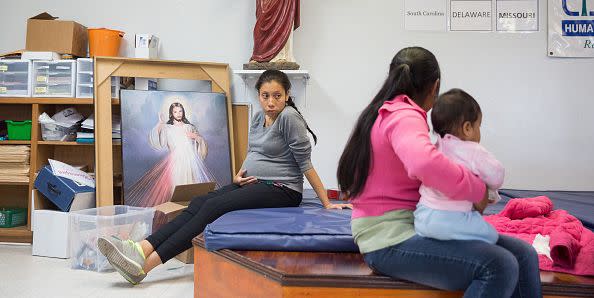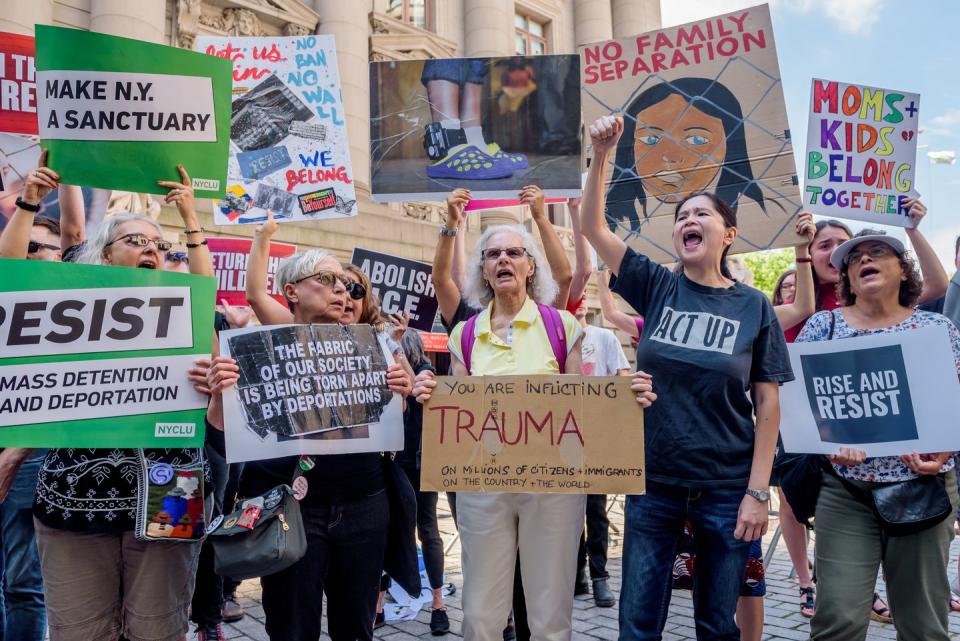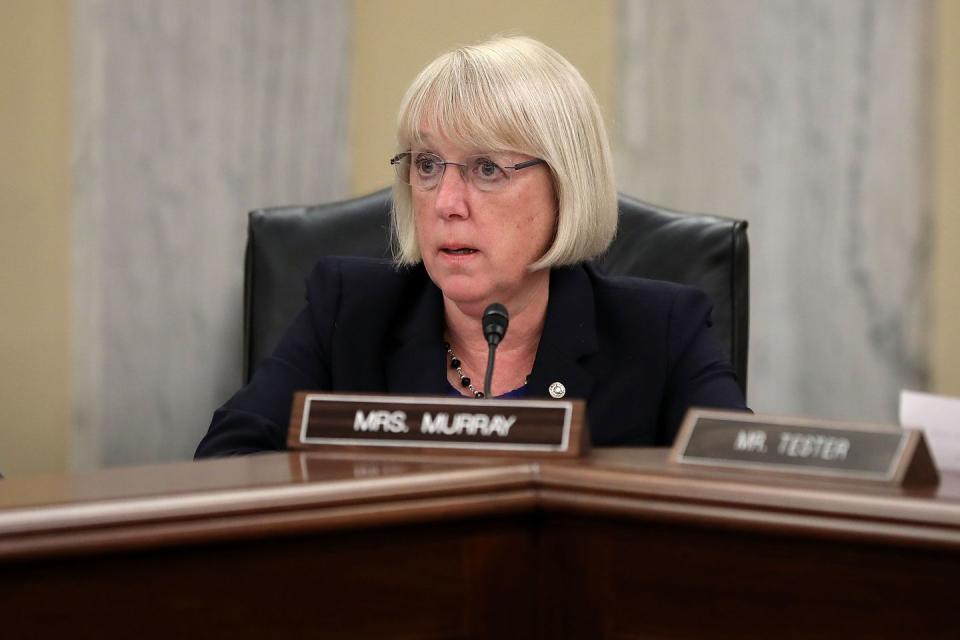As Long as Women Are Detained at the Border, Their Pregnancies Are at Risk

There’s seemingly no end to the horror inflicted on women detained by ICE. The news of Trump and Jeff Sessions’ mandatory family separation policy, which broke this June, sparked massive outcry and public demonstrations. But it was far from the first or only outrage committed by U.S. immigration officials. The heightened scrutiny sparked by the family-separation policy has exposed several further abuses - including the shackling and denial of medical attention to pregnant detainees, which has already resulted in the miscarriage of several pregnancies. New legislation introduced in the Senate aims to end these abuses, but some advocates say even that won’t be enough.
BuzzFeed News published a widely read investigation of the practice early last July. The stories were horrifying: A pregnant woman who fell on her belly in the eighth month of her pregnancy and was not taken to the hospital, or another who was forced to submit to multiple X-rays despite the potential harm to her fetus. One woman, identified only as “E,” described begging for medical attention as she began bleeding out: “An official arrived and they said it was not a hospital and they weren’t doctors. They wouldn’t look after me.”
As shocking as this is, it’s important to note that - like many of the immigration horror stories we’re now hearing - it is not unique to the Trump administration. The Obama administration also detained some pregnant women. “We are not seeing anything we haven’t been seeing for the last four years,” says Sera Bonds, Founder and Executive Director of Circle of Health International. “None of this is new.”

The situation has, admittedly, been aggravated by Trump. In March of 2018, he signed an executive order, rolling back an Obama-era policy of presumptive release for pregnant detainees. But advocates say that the uptick in miscarriages goes back well before Trump formally signed the executive order, to the beginning of his time in office.
“Women’s Refugee Commission has tracked the detention of pregnant women in ICE custody for many years,” says Katharina Obser, a Senior Policy Adviser of the Women’s Refugee Commission. “In 2016, ICE issued a new policy that included a presumption of release for many pregnant women, called for regular review of their custody if they were detained, and also included stricter oversight of their care. But by the summer of 2017, we increasingly heard of more cases of pregnant women who were not only detained, but also receiving inadequate care, practices counter to ICE’s own policy.”
In September of 2017, the Women’s Refugee Commission, working with several other organizations including the American Immigration Council and the ACLU, filed a joint administrative complaint with the Department of Homeland Security’s Office for Civil Rights and Civil Liberties and Office of Inspector General. That complaint, which is available in full online, details several horrific outcomes - including that of “Teresa,” a woman who miscarried in her second trimester and was kept in her cell, without medical attention, while bleeding heavily.
Even for women who don’t miscarry, Obser says, the level of neglect and stress experienced in ICE custody is unconscionable. She points to the story of “a pregnant woman [who] was transferred between detention facilities no fewer than 6 times, including one 23-hour trip with extremely restricted access to food and the bathroom.” In the published complaint, the woman, “Rosa,” said that she “experienced nausea and vomiting, weakness, headaches, abdominal pain, and vomited blood.”
In the hopes of combating these horrors, Senator Patty Murray (D-WA) has introduced the rather self-explanatory Stop Shackling and Detaining Pregnant Women Act, which she has specifically said was inspired by the July BuzzFeed News report. The bill is co-sponsored by 21 other senators, including several who are predicted to make Presidential runs in 2020, such as Sen. Elizabeth Warren (D-MA), Sen. Kirsten Gillibrand (D-NY), Sen. Bernie Sanders (I-VT) and Sen. Kamala Harris (D-CA).

“It is absolutely unacceptable that in our country pregnant women are being detained, shackled, and denied the care they need to have a healthy pregnancy,” Senator Murray said in a press release. “The Trump Administration should immediately reverse course on this heartless and dangerous policy that puts the health of mothers and infants at risk.”
The other Senators have expressed strong support for the bill. “Pregnant women should be treated with dignity, no matter what their immigration status is,” Warren said in a statement sent to ELLE.com by e-mail. “It is disgraceful that the Trump Administration has been shackling pregnant women and new mothers in immigration detention centers, and they should immediately stop this disturbing, inhumane practice. There is no place in our country for this kind of cruel treatment, period,” Gillibrand said, in another e-mail.
Still, the bill would need to pass a Republican congress. And, even if it does, advocates and activists are divided on precisely how effective it stands to be.
“This piece of legislation is terrific,” says Kirsten Rowe-Finkbeiner, co-founder and executive director of MomsRising, which is working to drum up grassroots support for the bill. “[It] re-instates the policy of presumptive release. It prohibits the shackling of pregnant labor at any point in labor delivery and postpartum… It requires pregnant women and youth to have privacy in their exams, and [mandates] quarterly reporting of treatment of pregnant women and youth that is delivered to Congress.”
She’s even optimistic about the bill’s chances of passing a Republican Congress. “The voices of women in particular have been more powerful than anyone imagined would be possible in the Trump administration,” she says, citing previous activist efforts to defend the Affordable Care Act and SNAP benefits. “It’s not out of reach that women could rise up, as they are doing right now, and help this bill actually pass. It’s going to take people stepping forward, doubling down, reaching out to friends, families, other women in their community, but we’ve shown that women are a powerful force.”
Other advocates are more skeptical. Many Republicans are vehement about the “right to life” when it comes to denying women and trans people abortions – including detained women – but when it comes to an immigrant woman’s desire to keep her much-wanted pregnancy, that passion tends to vanish.
Sera Bonds points out that the shackling mentioned in the bill’s title - which includes the use of “belly chains,” or shackles around the stomach, that can harm the fetus in a second- or third-trimester pregnancy - is supposedly already forbidden by ICE, and yet its use has continued. The problem is not that there are no rules governing the treatment of pregnant detainees. The problem is that even the few rules that do exist are reportedly being broken. (ICE denies this, telling BuzzFeed that it follows the guidelines for detaining pregnant women set forth on its website; that website says that “all detainees receive necessary and appropriate health services, food, and care.”)
“None of these bills have really changed anything,” Bonds told me. “This is such a closed system, there’s no transparency to it. Even physicians can’t access it… The head of the American Academy of Pediatrics went to one of these centers and tried to gain access and was denied. Passing a bill in Washington or Austin does very little to change the daily reality that women in detention are experiencing. I don’t mean to sound so Debbie Downer about it. The bills are necessary and the phone calls are necessary, but this is a much bigger problem that we have here.”
With a problem this deeply ingrained, Bonds says, there may be no real solution outside of total systemic and cultural change. “One piece of legislation is not going to change their behavior, especially when there are no real consequences,” she told me. Instead, “what we need is a significant overhaul of immigration policy and culture around immigrants.”
As long as women are being detained at the border, there is a chance that some of them will be pregnant; as long as pregnant women are detained, it’s possible - even likely - that their pregnancies will be put at risk. Frankly, the dehumanization, neglect and abuse described by pregnant detainees is so horrific that it shouldn’t be happening to anyone, pregnant or not. Necessary as the Stop Shackling and Detaining Pregnant Women Act might be, there is a much deeper culture of cruelty at work. Until that culture changes, we’ll be left excavating a seemingly never-ending list of horrors.
“This is America’s story,” Bonds says. “This is immigration in America. We have a long history of putting women and children in cages.”
('You Might Also Like',)

